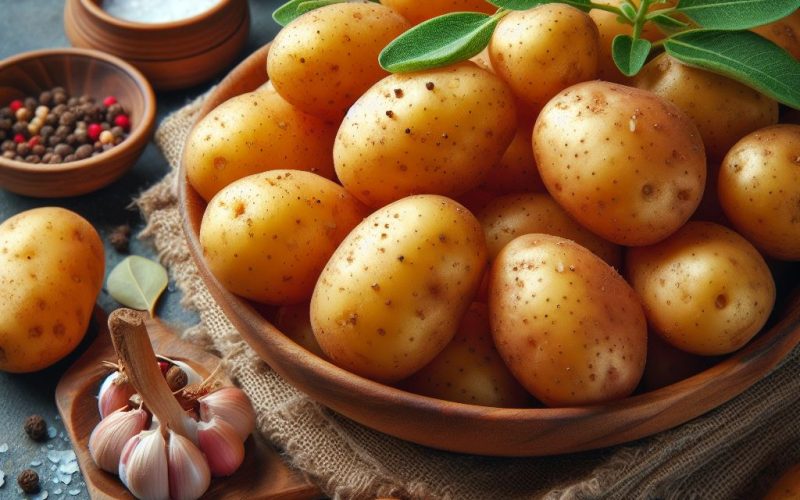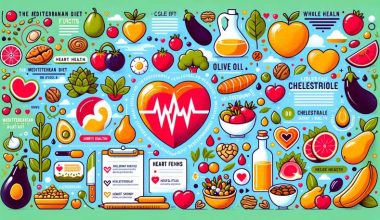Yes, potatoes are allowed on the Mediterranean diet in moderation. Potatoes provide essential nutrients and can be enjoyed as part of a balanced Mediterranean diet.
Prioritizing non-starchy vegetables is recommended, but starchy options like potatoes can still be included in moderation.
The Relationship Between Potatoes And The Mediterranean Diet
The Relationship Between Potatoes and the Mediterranean Diet
The Role Of Potatoes In The Mediterranean Diet
Potatoes are a starchy vegetable that has been a staple in the Mediterranean diet for centuries. Although traditional Mediterranean cuisine focuses on a variety of vegetables, legumes, fruits, and whole grains, potatoes hold a significant place in the diet of this region. They are versatile and can be prepared in various ways such as boiling, roasting, or grilling, making them a valuable ingredient in Mediterranean dishes.
Benefits Of Potatoes In A Mediterranean Diet
When consumed as part of a balanced Mediterranean diet, potatoes offer numerous health benefits. They are a good source of vitamins, minerals, and fiber. Potatoes also provide sustained energy, making them an ideal choice for active individuals following a Mediterranean-style lifestyle. Additionally, the resistant starch found in potatoes acts as a prebiotic, supporting gut health and digestion, a crucial aspect of the Mediterranean diet.
Understanding The Mediterranean Diet
Many people wonder whether you can eat potatoes on the Mediterranean diet. It’s recommended by experts that you prioritize non-starchy vegetables like dark leafy greens, bell peppers, and broccoli among others. But you can definitely enjoy starchy options like potatoes in moderation on a Mediterranean diet.
Key Components Of The Mediterranean Diet
The Mediterranean diet is widely known for its health benefits and is often referred to as one of the healthiest diets in the world. This diet places emphasis on consuming foods that are rich in nutrients and low in saturated fats and added sugars. The key components of the Mediterranean diet include:
- High consumption of fruits and vegetables
- Whole grains as the primary source of carbohydrates
- Healthy fats, such as olive oil, nuts, and seeds
- Moderate intake of lean proteins, like fish, poultry, and legumes
- Reduced consumption of red meat and processed foods
- Moderate consumption of dairy products
- Regular physical activity
- Moderate intake of red wine
Foods To Emphasize And Limit In The Mediterranean Diet
When following the Mediterranean diet, it’s important to emphasize certain foods while limiting others. Here’s a breakdown:
Foods to Emphasize:
- Fruits and vegetables: Aim to include a variety of fresh, seasonal produce in your daily meals. These are packed with essential vitamins, minerals, and fiber.
- Whole grains: Choose whole grain options like oatmeal, quinoa, brown rice, whole grain bread, and whole grain pasta. These provide a good source of complex carbohydrates and more fiber compared to refined grains.
- Healthy fats: Use olive oil as your primary cooking oil and incorporate nuts, seeds, and avocados into your meals. These fats are rich in monounsaturated and polyunsaturated fats, which are beneficial for heart health.
- Lean proteins: Include fish, such as salmon and sardines, as well as poultry, beans, and lentils. These are great sources of lean protein and contain important nutrients like omega-3 fatty acids.
- Dairy products: Opt for low-fat or Greek yogurt and small amounts of cheese. These provide calcium and protein while being lower in saturated fats compared to whole-fat dairy products.
- Regular physical activity: Incorporate exercise into your daily routine, such as walking, swimming, or yoga. This helps to maintain a healthy weight and overall well-being.
- Red wine: Enjoy a glass of red wine in moderation. It contains antioxidants and may have some heart-protective effects, but remember to drink responsibly.
Foods to Limit:
- Red meat and processed meats: Limit your consumption of red meat and processed meats like sausages and hot dogs. These are typically higher in saturated fats and may increase the risk of certain health conditions.
- Sweets and sugary drinks: Limit your intake of sweets, desserts, sugary beverages, and processed snacks. These often contain added sugars and provide empty calories.
- Butter and high-fat dairy: Reduce your consumption of butter and high-fat dairy products. These are high in saturated fats, which can have negative effects on heart health when consumed in excess.
- Alcohol: While moderate red wine consumption is part of the Mediterranean diet, it’s important to drink alcohol in moderation. Excessive alcohol intake can have negative health effects.
Incorporating Potatoes Into A Mediterranean Diet
The Mediterranean diet is known for its emphasis on fresh and whole foods, such as fruits, vegetables, nuts, legumes, and olive oil. While it may seem like potatoes, with their starchy nature, would not be a part of this healthy eating plan, they can actually be incorporated into a Mediterranean diet in moderation. Potatoes provide essential nutrients and can be prepared in various ways to complement the flavors of the Mediterranean cuisine.
Best Practices For Including Potatoes In The Diet
- Choose potatoes with a low glycemic index, such as sweet potatoes, to help regulate blood sugar levels.
- Opt for organic potatoes to minimize exposure to pesticides and chemicals.
- Include a variety of colored potatoes, such as red and purple, to diversify the nutrient content.
- Prepare potatoes using healthy cooking methods like roasting, boiling, or steaming, instead of frying.
- Pair potatoes with Mediterranean ingredients like olive oil, garlic, lemon juice, and fresh herbs to enhance the flavors.
Creative Potato Recipes With A Mediterranean Twist
If you’re looking for some creative ways to incorporate potatoes into your Mediterranean diet, here are a few recipes to try:
Mediterranean Roasted Potatoes: Toss red potatoes with Greek seasoning, olive oil, garlic, and bake until crispy.
Mediterranean Potatoes: Drizzle olive oil over yellow potatoes, sprinkle with lemon juice, sea salt, and fresh herbs, and roast until golden brown.
Mediterranean Loaded Baked Potato: Top a baked russet potato with Greek tzatziki sauce, feta cheese, tomato, olives, and a drizzle of olive oil.
By incorporating potatoes into your Mediterranean diet in these creative ways, you can enjoy their deliciousness while still following the principles of the Mediterranean lifestyle.
Addressing Common Misconceptions About Potatoes In The Mediterranean Diet
Potatoes are indeed part of the Mediterranean diet and can be enjoyed in moderation alongside other nutritious options. Despite common misconceptions, potatoes provide essential nutrients like potassium and vitamin C, making them a valuable inclusion in a balanced Mediterranean meal plan.
Debunking Myths About Potatoes And Carbohydrates
Many people wonder whether potatoes can be a part of the Mediterranean diet. Contrary to popular belief, potatoes can be enjoyed in moderation on the Mediterranean diet. There is a common myth that all carbohydrates, including potatoes, should be avoided when following a Mediterranean diet. However, this misconception fails to consider the nutritional value of potatoes and the importance of consuming them in moderation.
Exploring The Nutritional Value Of Potatoes In Moderation
Potatoes are often demonized due to their high carbohydrate content, but they are actually a nutrient-dense and versatile vegetable. When consumed in moderation, potatoes can contribute to a balanced Mediterranean diet. They are a good source of vitamin C, potassium, and dietary fiber. Additionally, potatoes can be prepared in a variety of healthy ways, such as roasting or boiling, which helps preserve their nutritional value and minimize the addition of unhealthy fats and oils.
Expert Opinions And User Experiences
Expert Opinions and User Experiences:
When it comes to understanding the role of potatoes in the Mediterranean diet, insights from health professionals can shed light on its benefits. Real-life stories of individuals incorporating potatoes into their Mediterranean diet offer valuable experiences that showcase the versatility and nutrition potatoes can bring to this renowned eating pattern.
Insights From Health Professionals On Potatoes And The Mediterranean Diet:
Experts agree that including potatoes in moderation can benefit the Mediterranean diet. Potatoes are nutrient-dense and a good source of fiber, promoting satiety and aiding in digestive health. While starchy, the Mediterranean diet emphasizes balance, making room for healthier carbohydrate options like potatoes.
Real-life Stories Of Individuals Incorporating Potatoes Into Their Mediterranean Diet:
From savory roasted potatoes to Mediterranean loaded baked potato recipes, real-life stories highlight how individuals creatively incorporate potatoes into their Mediterranean diet. Whether mashed, roasted, or as a side dish, potatoes add flavor and satisfaction to meals while aligning with the principles of this heart-healthy eating pattern.
Frequently Asked Questions On Are Potatoes Mediterranean Diet
Can I Have Potatoes On Mediterranean Diet?
Yes, potatoes can be included in the Mediterranean diet in moderation. They provide essential nutrients and can be enjoyed as part of a balanced diet.
What Can The Mediterranean Diet Not Eat?
On the Mediterranean diet, you should not eat red meat, processed meat and foods, sweets, alcohol, butter, whole-fat dairy, and sugary drinks. However, you can enjoy potatoes in moderation as they are a good source of nutrients.
What Carbs Are Allowed On Mediterranean Diet?
Potatoes are allowed on the Mediterranean diet. They are enjoyed in moderation as a starchy option. Potatoes are nutrient-rich and can be a good source of potassium and vitamin C.
Are Bananas Allowed On The Mediterranean Diet?
Yes, bananas are allowed on the Mediterranean diet. All types of fresh fruits, including bananas, are encouraged as part of the diet.
Conclusion
Potatoes can be enjoyed in moderation as part of the Mediterranean diet. They provide essential nutrients and can be prepared in ways that align with the principles of this healthy eating plan. Including a variety of foods, including potatoes, can contribute to a balanced and sustainable Mediterranean diet.







